Top 10+ Asset Tokenization Companies Worldwide in 2026
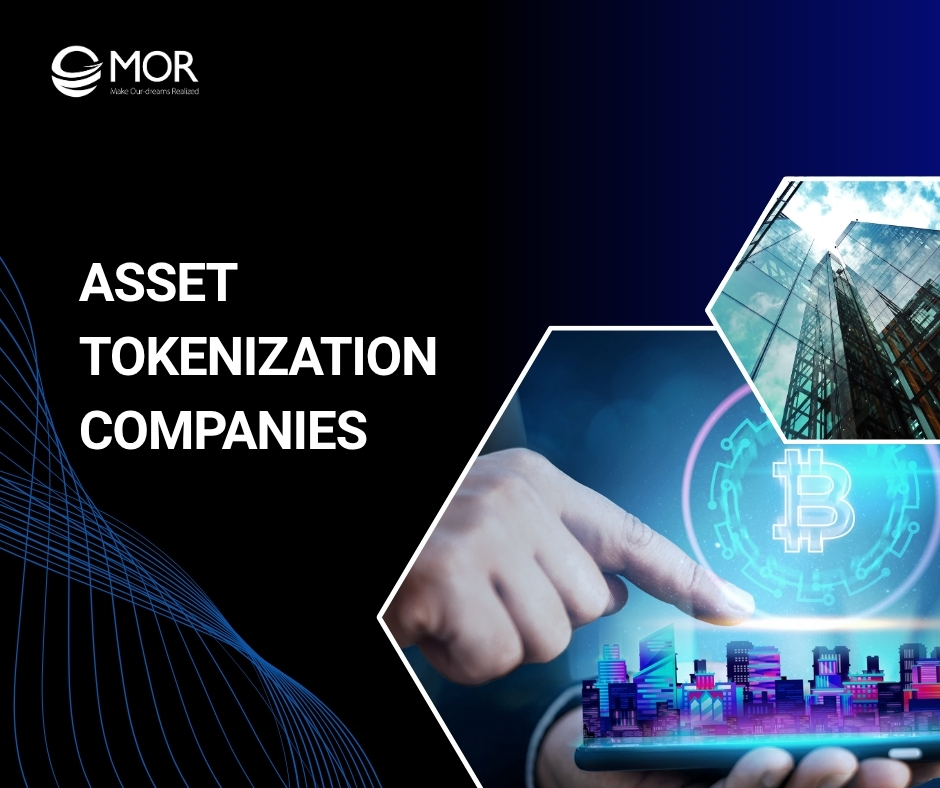
The rapid growth of blockchain technology has created a new demand for asset tokenization companies capable of turning physical assets into secure, tradable digital tokens. Yet, with so many providers emerging, finding the right partner for real world asset tokenization can be challenging. This MOR Software’s guide highlights the top asset tokenization companies to invest in 2026, helping you find trusted partners to turn your assets into digital value.
What Is Asset Tokenization?
Asset tokenization refers to the process of converting tangible or intangible assets into digital tokens stored on a blockchain. Global interest is rising fast, with Citi estimating tokenized assets could reach about $4 trillion in value by 2030, showing how quickly this market is maturing.
These assets can include real estate, commodities, art, or intellectual property. Each token represents a share or ownership right in the underlying asset, allowing secure, verifiable, and transparent transactions across digital ecosystems. Through this approach, asset tokenization companies create new pathways for investors to access previously illiquid markets and participate in fractional ownership models that were once limited to high-value investors.
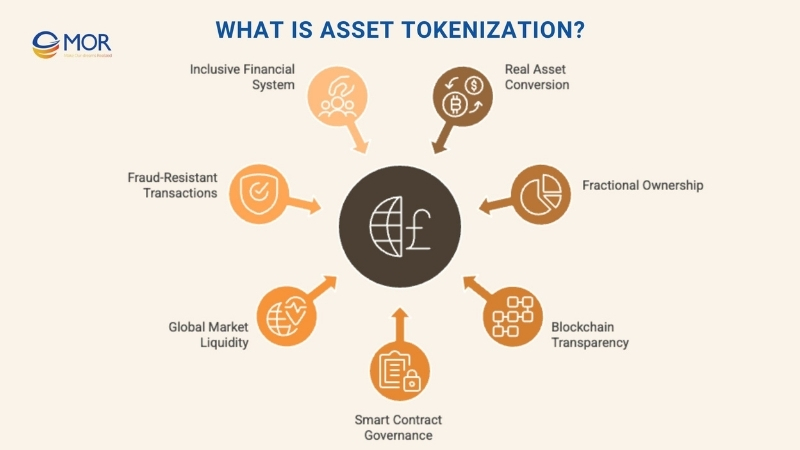
This form of tokenization of assets uses smart contracts to define how ownership, transfer, and governance operate on the blockchain. Once created, tokens can be exchanged on decentralized trading platforms, providing global reach and liquidity. With real world asset tokenization, markets that traditionally faced accessibility barriers, like property or fine art, can now be divided into smaller, tradable units. This makes participation easier for a wide range of investors and enhances market efficiency.
Operating on a tokenization platform, transactions become faster, more traceable, and resistant to fraud. There are still some risks, but the open nature of blockchain helps regulators keep watch more effectively. In 2023, Chainalysis reported that wallets linked to illegal activity took in about $24 billion, which made up only 0.34% of all crypto transactions that year.
Every tokenized transfer is recorded on an immutable ledger, giving businesses and investors complete transparency. As industries continue to explore this model, asset tokenization companies are proving how blockchain can increase liquidity, simplify compliance, and strengthen trust. From tokenized real estate and equities to digital collectibles, the technology’s reach continues to expand, reshaping how people perceive ownership and investment.
With its ability to reduce entry barriers and align with evolving financial regulations, asset tokenization is not just a technical upgrade, it’s a structural shift toward a more inclusive financial system. The growing adoption of digital asset tokenization signals a major leap forward for global finance, bridging the gap between traditional investments and the digital economy.
Why Businesses Partner With Asset Tokenization Companies
Asset tokenization companies serve as the crucial bridge between traditional finance and blockchain innovation. They enable enterprises to convert tangible and intangible assets into blockchain-based tokens, ensuring security, transparency, and accessibility for global investors.
The demand for these experts continues to rise as more organizations explore tokenizing real world assets and seek compliant, scalable solutions to unlock liquidity. Many leading companies now specialize in building reliable systems for enterprises and investors who aim to modernize their asset management process through blockchain technology.
Global regulators are also pushing for progress. The G20, for instance, aims to cut average cross-border payment costs to about 1% and remove any routes costing over 3% by the end of 2027. This shows the move toward faster and more efficient financial systems.
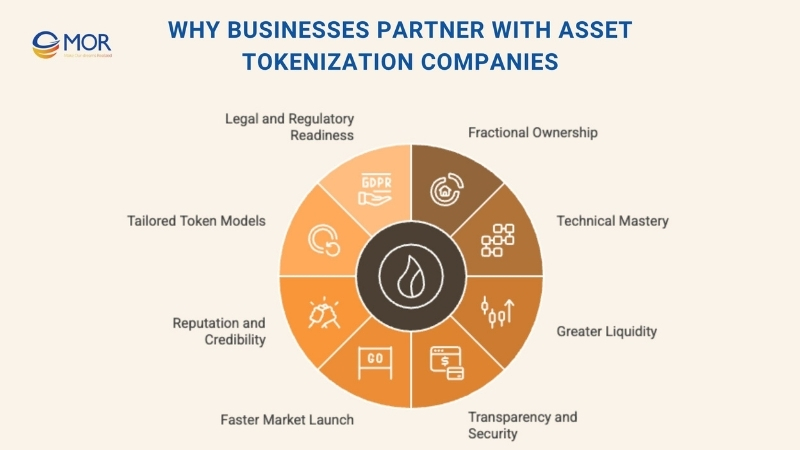
Fractional Ownership
One of the biggest advantages offered by asset tokenization companies is fractional ownership. Through real world assets tokenization, high-value properties or commodities can be divided into smaller tradable units. With this approach, fractional models can open access to private markets worth several trillion dollars, allowing more investors to join opportunities that were once limited to a select few.
This approach opens the door for a diverse investor base to participate without the need for massive capital. It improves liquidity and makes asset trading more inclusive across global markets.
Technical Mastery
Behind every successful tokenized asset lies strong technical expertise. Asset tokenization companies bring advanced blockchain engineering, smart contract deployment, and data management capabilities into one unified system. Their knowledge of asset tokenization platform development ensures scalability, transaction accuracy, and security while maintaining compliance with global regulations.
Greater Liquidity
Liquidity is one of the driving forces of digital asset tokenization. By transforming physical or financial assets into tokens, asset tokenization companies make trading faster and more accessible. Peer-to-peer transactions become easier, reducing settlement delays and administrative costs. The result is a vibrant secondary market where investors can buy or sell tokenized assets in real time.
Transparency And Security
Through blockchain and defi tokenization, asset tokenization companies establish trust between issuers and investors. Immutable ledgers guarantee that every transaction is recorded permanently, while advanced encryption methods protect investor data. This level of transparency minimizes fraud risks and builds long-term confidence in token-based systems.
Faster Market Launch
Speed matters when introducing new financial products. Asset tokenization companies leverage ready-made frameworks and pre-tested infrastructures to help clients bring tokenization of real world assets to market quickly. Interest is rising across several areas, with BCG noting that tokenized funds could attract about $290 billion in investment as on-chain money becomes more regulated and trusted.
Their streamlined workflows reduce development costs and shorten time-to-market, allowing businesses to attract investors sooner.
Reputation And Credibility
Trust drives adoption. Reputable asset tokenization companies follow strict data protection practices and uphold international standards to maintain investor confidence. Their proven track record helps ensure tokenized assets remain credible, stable, and compliant across jurisdictions.
Tailored Token Models
Each project requires a different token structure depending on asset type and investor profile. Skilled asset tokenization companies offer customization options that align with specific financial goals and regulatory frameworks. They design token models that enhance performance, accessibility, and overall asset value.
Legal And Regulatory Readiness
Every tokenized asset must meet global compliance standards. A reliable asset tokenization company ensures full adherence to KYC, AML, and security laws, safeguarding both issuers and investors. Regulation is tightening as well, with FATF noting that by 2025, 85 jurisdictions had already adopted the Travel Rule for crypto transfers, showing stronger control over how value moves on chain.
Staying ahead of evolving policies, these firms help clients manage risk effectively and expand confidently into new markets.
List Of 12 Leading Asset Tokenization Companies In 2026
The rise of asset tokenization companies is reshaping how industries handle ownership, trading, and investment. The ability to enable tokenization of real world assets has expanded across sectors including real estate, healthcare, and digital art. These innovators build trusted systems for issuing, managing, and trading tokenized assets while ensuring compliance and transparency. Below are the leading firms in 2026 building scalable asset tokenization platforms that improve accessibility, liquidity, and trust for businesses and investors.
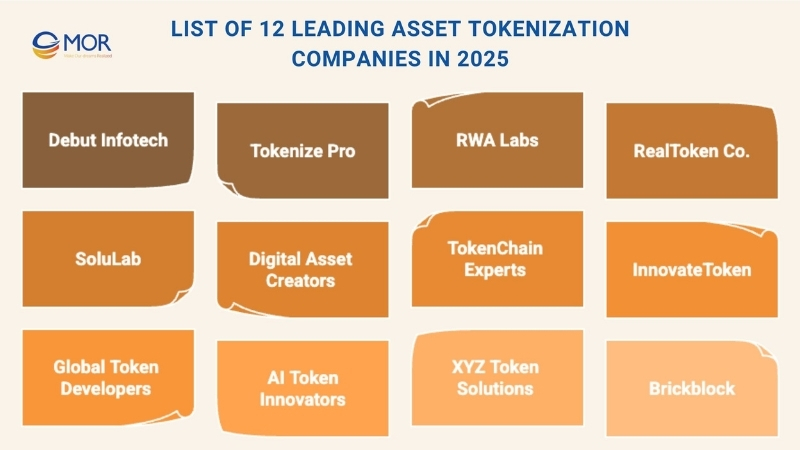
Debut Infotech
Headquarters: Mohali, India
Overview: Debut Infotech stands among the top asset tokenization companies globally, recognized for its deep blockchain expertise and enterprise-grade tokenization of assets solutions. The company delivers specialized services in areas like real estate, healthcare, and supply chain management, helping organizations digitize and manage high-value physical assets. Their focus on automation and blockchain interoperability makes them a strong partner for enterprises adopting real world asset tokenization.
Key Offerings:
- End-to-end development of secure, scalable tokenization platforms.
- AI-enabled data management and smart contract automation.
- Proven record of creating compliant real estate and financial token ecosystems.
Tokenize Pro
Headquarters: New York, USA
Overview: Tokenize Pro is one of the most recognized asset tokenization companies in USA, known for building compliance-focused and scalable blockchain ecosystems. The firm delivers tailored solutions for tokenizing real world assets, with a strong emphasis on legal security and technical precision. Its services span across real estate, commodities, and digital art, offering an advanced asset tokenization platform that ensures transparency, regulatory alignment, and efficient trading for businesses of all sizes.
Key Offerings:
- Comprehensive asset tokenization services for real estate, commodities, and art.
- Integrated blockchain and automated compliance monitoring.
- Proven expertise in developing secure, high-performance tokenization platforms for enterprise clients.
RWA Labs
Headquarters: London, UK
Overview: RWA Labs is a trusted name among global asset tokenization companies, focusing on secure and transparent solutions for real world assets tokenization. The company specializes in transforming illiquid assets like real estate and commodities into easily tradable digital tokens. With a client-first approach, RWA Labs delivers scalable tools for asset fractionalization, seamless trading, and long-term digital asset management, helping businesses tap into new liquidity opportunities.
Key Offerings:
- Token-based fractional ownership systems for real estate and commodities.
- Scalable tokenization platforms tailored for multiple industries.
- End-to-end blockchain integration and asset digitization services.
RealToken Co.
Headquarters: Detroit, USA
Overview: RealToken Co. is one of the most established asset tokenization companies in the real estate sector. The firm focuses on simplifying property transactions through legally compliant blockchain frameworks that support tokenization of real world assets. RealToken Co. ensures full adherence to both U.S. and international regulations while offering end-to-end solutions for tokenizing real estate, commodities, and digital art. Their platform is designed to enhance transparency, liquidity, and trust across all investment levels.
Key Offerings:
- Advanced, regulation-compliant real estate tokenization platforms.
- AI-powered data tokenization tools for property valuation and market analysis.
- Proven experience in developing scalable systems for retail and institutional investors.
SoluLab
Headquarters: New York, USA
Overview: SoluLab stands out as one of the most innovative asset tokenization companies specializing in real world asset tokenization for global enterprises. The company combines blockchain technology with AI-driven intelligence to help businesses digitize and manage assets such as real estate, commodities, and intellectual property. Their enterprise-grade systems are built to ensure scalability, compliance, and data security, making SoluLab a trusted partner for organizations seeking advanced asset tokenization platform development and seamless blockchain adoption.
Key Offerings:
- Regulation-compliant tokenization platforms built for global scalability.
- Comprehensive tokenization of assets across real estate, art, and commodities.
- End-to-end blockchain engineering and smart contract automation.
- AI-powered insights for asset tracking, valuation, and investor engagement.
Digital Asset Creators
Headquarters: Dubai, UAE
Overview: Digital Asset Creators is a fast-growing innovator among global asset tokenization companies, known for combining blockchain and artificial intelligence to deliver secure and data-driven digital asset tokenization. The firm provides full-cycle services for businesses aiming to tokenize intellectual property, real estate, and precious metals. By integrating AI-powered analytics and blockchain automation, they ensure precision, transparency, and security across every transaction.
Key Offerings:
- Expertise in AI-based trading and data tokenization systems.
- Advanced analytics tools for evaluating and managing tokenized assets.
- Blockchain-powered infrastructure supporting seamless real world asset tokenization.
TokenChain Experts
Headquarters: Zurich, Switzerland
Overview: TokenChain Experts ranks among the top European asset tokenization companies, delivering innovative and compliance-focused solutions for tokenization of real world assets. The firm’s expertise spans real estate, commodities, and luxury assets, offering clients the tools to tokenize and manage assets securely through blockchain-based ecosystems. With strong capabilities in smart contract development, compliance automation, and AI-driven analytics, TokenChain Experts empowers businesses to achieve seamless asset fractionalization and trading efficiency.
Key Offerings:
- Industry-leading expertise in real estate tokenization and blockchain compliance.
- AI-powered systems for intelligent asset monitoring and management.
- Complete end-to-end infrastructure for automated trading and asset tokenization.
InnovateToken
Headquarters: Toronto, Canada
Overview: InnovateToken is a rising force among asset tokenization companies, specializing in building scalable and secure solutions for real world asset tokenization. The company integrates blockchain and AI technologies to enhance asset value, transparency, and compliance. Known for its agility, InnovateToken supports startups and enterprises alike in digitizing real estate, commodities, and intellectual property, ensuring smooth operations and adherence to global regulatory frameworks.
Key Offerings:
- Secure, high-performance real estate tokenization platforms.
- AI-powered analytics for accurate asset valuation and strategic insights.
- Comprehensive asset tokenization services for multiple industries and markets.
Global Token Developers
Headquarters: Hong Kong, China
Overview: Global Token Developers is one of Asia’s most trusted asset tokenization companies, offering tailored blockchain solutions for businesses looking to digitize and manage physical assets. Their services span tokenization of assets across real estate, art, and commodities, with full blockchain integration for transparency and automation. By combining advanced smart contract frameworks with compliance-ready systems, the company ensures seamless token lifecycle management and global scalability for clients.
Key Offerings:
- Customized token development and deployment for real world asset tokenization.
- Blockchain-based asset management and automated tracking.
- End-to-end compliance support for cross-border tokenization initiatives.
AI Token Innovators
Headquarters: San Francisco, USA
Overview: AI Token Innovators stands out among leading asset tokenization companies for merging artificial intelligence with blockchain to deliver advanced asset tokenization platforms. The firm specializes in creating intelligent systems tailored to businesses exploring tokenizing real world assets while enhancing efficiency and automation. Their AI-powered approach enables predictive analytics, automated trading, and smart decision-making, positioning them as a pioneer in the next generation of tokenization technology.
Key Offerings:
- Cutting-edge tokenization platforms built for diverse industries.
- AI-driven chatbot and automation tools for seamless user interaction.
- Comprehensive blockchain and AI integration for crypto trading and digital asset management.
XYZ Token Solutions
Headquarters: Sydney, Australia
Overview: XYZ Token Solutions is a prominent player in the Asia-Pacific region, recognized among global asset tokenization companies for its innovation in real world asset tokenization. The company provides tailored blockchain solutions that simplify property tokenization and enable broader investor participation. By merging AI analytics with blockchain infrastructure, XYZ Token Solutions empowers organizations to streamline operations, enhance asset visibility, and expand access to new capital opportunities through compliant tokenized systems.
Key Offerings:
- End-to-end real estate tokenization development and consulting.
- Secure data tokenization and asset management solutions.
- AI-enhanced tools for strategic investment decisions and automated trading.
Brickblock
Headquarters: Berlin, Germany
Overview: Brickblock is one of Europe’s most recognized asset tokenization companies, known for transforming property ownership through blockchain technology. The platform enables property owners to digitize and trade shares of their holdings securely, promoting wider access to tokenization of real world assets. With a strong focus on transparency and investor protection, Brickblock simplifies global real estate investing by providing a compliant, user-friendly environment for token issuance and trading.
Key Offerings:
- Blockchain-based fractional ownership systems for real estate assets.
- AI-powered asset tokenization platforms for global trading and asset management.
- Scalable, regulation-ready solutions improving accessibility in worldwide tokenized markets.
Comparing The Top 12 Asset Tokenization Companies In 2026
To help you evaluate each provider’s strengths and specialization, we’ve compared the leading asset tokenization companies shaping the market in 2026. The table below highlights their headquarters, expertise, and key offerings to guide your decision-making.
Company | Headquarters | Overview | Key Offerings |
Debut Infotech | Mohali, India | A leading blockchain developer specializing in real-world asset tokenization for industries like real estate, healthcare, and supply chain. Known for scalable, AI-powered token systems. | • Custom tokenization for multiple asset classes • AI-driven trading and data tokenizing • Proven real estate tokenization platforms |
Tokenize Pro | New York, USA | Builds customizable, compliance-ready tokenization platforms for real estate and digital assets. Focused on security, scalability, and regulatory alignment. | • Real estate and AI tokenization • Blockchain integration with compliance • Scalable tokenization systems |
RWA Labs | London, UK | Offers secure and transparent RWA development for fractional ownership and trading. Designed for real estate and commodities. | • Fractional ownership platforms • Scalable multi-industry tokenization • Blockchain integration and support |
RealToken Co. | Detroit, USA | Focuses on legal-compliant property tokenization and digital asset trading. Recognized for simplifying real estate transactions globally. | • Advanced real estate tokenization • AI-based analytics for valuation • Compliance across multiple jurisdictions |
SoluLab | New York, USA | Global blockchain and AI development company delivering large-scale RWA tokenization across multiple industries. | • Regulatory-compliant token platforms • Multi-sector blockchain tokenization • AI analytics and smart contract integration |
Digital Asset Creators | Dubai, UAE | Specializes in asset tokenization and AI-based crypto trading tools. Provides end-to-end solutions for digitizing valuable assets. | • Quantitative crypto trading and tokenizing • AI analytics for asset evaluation • Blockchain-backed RWA systems |
TokenChain Experts | Zurich, Switzerland | Creates high-performance tokenization systems focused on compliance, smart contracts, and AI-powered management tools. | • Real estate tokenization services • AI-enabled asset management • Automated crypto trading and tokenization |
InnovateToken | Toronto, Canada | A real estate tokenization pioneer offering AI-powered valuation tools and scalable solutions for global enterprises. | • Secure real estate tokenization • AI analytics for decision-making • Global multi-industry tokenization |
Global Token Developers | Hong Kong, China | Provides tailored token development and full blockchain integration for asset-backed tokens worldwide. | • Custom RWA token development • End-to-end blockchain integration • Global compliance management |
AI Token Innovators | San Francisco, USA | Merges AI with blockchain to deliver advanced tokenization platforms, chatbots, and crypto automation systems. | • AI-powered tokenization • Integrated chatbot tools • Automated crypto trading solutions |
XYZ Token Solutions | Sydney, Australia | Helps property owners and enterprises build real estate tokenization platforms using AI-driven blockchain tools. | • Real estate tokenization • Secure data tokenization • AI tools for analytics and strategy |
Brickblock | Berlin, Germany | Enables fractional property ownership through blockchain. Focuses on accessibility, transparency, and secure investment platforms. | • Fractional real estate ownership • AI-based global tokenization platforms • Scalable, compliant investment solutions |
Types Of Tokenized Assets Managed By Asset Tokenization Companies
Today, asset tokenization companies support multiple forms of tokenization across industries, each serving specific business models and investor needs. These solutions enhance liquidity, transparency, and global accessibility for diverse asset classes through blockchain-backed ownership systems. Below are the most common categories of tokenization of assets currently reshaping financial and commercial ecosystems.
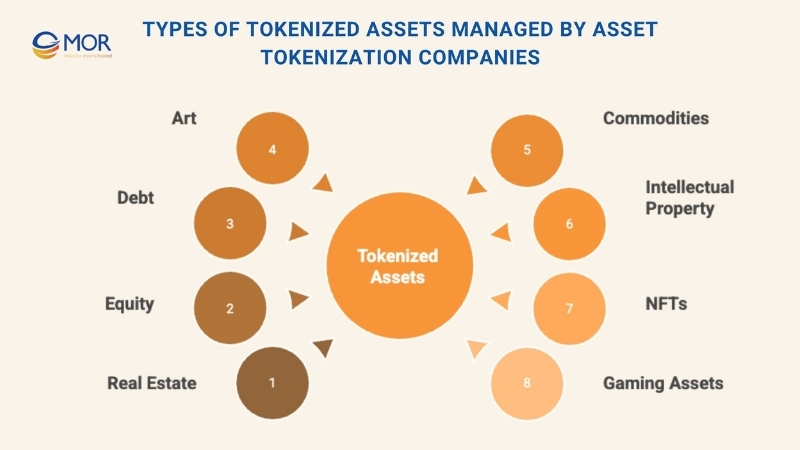
Real Estate Tokenization
This involves converting physical real estate into digital tokens that represent ownership shares in a property. By enabling real world asset tokenization, investors gain access to fractional ownership, increased liquidity, and the ability to trade real estate assets more freely. It also lowers entry barriers for those who wish to invest in property markets without requiring full ownership.
Equity Tokenization
Through equity tokenization, companies can issue blockchain-based tokens representing shares or stakes in their business. These digital assets simplify trading and record-keeping while cutting the administrative costs of traditional equity issuance. Asset tokenization companies create secure platforms that make equity transfers faster, auditable, and globally accessible.
Debt Tokenization
Debt tokenization converts bonds, loans, or other debt instruments into blockchain-backed tokens. This allows faster settlements, greater transparency, and more efficient trading. For investors, it expands access to fixed-income opportunities that were once restricted to large institutions.
Art Tokenization
With tokenizing real world assets like fine art, investors can own fractional shares of high-value works, transforming art into a liquid and tradeable asset class. Blockchain validation ensures provenance tracking, protecting both artists and investors from forgery or misrepresentation.
Commodity Tokenization
Physical commodities, such as gold, silver, oil, and agricultural goods, can be tokenized to represent ownership of the underlying resource. This makes commodity trading faster and more transparent, while asset tokenization companies provide the infrastructure for global, 24/7 markets.
Intellectual Property (IP) Tokenization
Intellectual properties like patents, trademarks, and copyrights can be digitized, giving creators the ability to share fractional ownership or future royalties. This form of tokenization platform benefits both investors and innovators by unlocking new revenue channels through blockchain-certified contracts.
NFT Tokenization
Non-fungible tokens (NFTs) represent unique digital assets that authenticate ownership of distinct collectibles or artworks. With digital asset tokenization, creators and brands can tokenize one-of-a-kind assets that carry verifiable authenticity and value within decentralized ecosystems.
Gaming Asset Tokenization
In the gaming world, players can tokenize characters, weapons, or virtual items into blockchain-based collectibles. These assets can be traded freely across compatible gaming ecosystems, giving players true ownership and transfer rights supported by blockchain infrastructure.
Key Roles And Responsibilities Of Asset Tokenization Companies
Asset tokenization companies play a vital role in connecting traditional industries with blockchain innovation. They bring together advanced technology, regulatory expertise, and strategic consulting to convert tangible and intangible assets into blockchain-based tokens. Below are the core functions these companies perform to ensure smooth and compliant tokenization of assets.
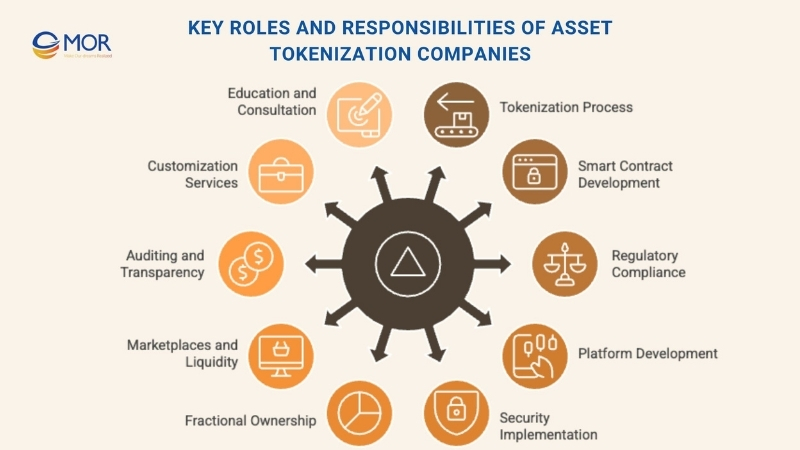
Tokenization Process Facilitation
These firms oversee the end-to-end conversion of physical or digital assets into tokens. They define token models, establish compliance measures, and determine governance mechanisms. By handling the technical and structural setup, asset tokenization companies ensure every project is built on a strong legal and technological foundation.
Smart Contract Development
Smart contracts are at the heart of every tokenized ecosystem. They automate ownership transfers, payouts, and compliance checks. Leading asset tokenization companies design, develop, and deploy these contracts to guarantee security, transparency, and automation across all transactions involving tokenized money and assets.
Regulatory Compliance And Legal Support
A major responsibility of any asset tokenization company is ensuring compliance with international and jurisdictional laws. This includes Know Your Customer (KYC), Anti-Money Laundering (AML), and securities regulations. They provide legal frameworks, licensing guidance, and documentation to help clients remain compliant in all regions.
Platform Development
These companies build scalable tokenization platforms where users can issue, trade, and manage tokens seamlessly. The platforms integrate wallet systems, payment gateways, and blockchain networks, offering businesses an intuitive environment to launch and operate their tokenized assets.
Security Implementation
Safeguarding digital tokens is a top priority. Asset tokenization companies use encryption, anti-fraud technologies, and cybersecurity audits to prevent unauthorized access or breaches. Their advanced infrastructure ensures asset integrity and investor trust.
Fractional Ownership Enablement
Tokenization enables fractional ownership, allowing investors to buy smaller shares of high-value assets. By designing tokens that represent fractionalized holdings, asset tokenization companies make investment opportunities more inclusive and increase asset liquidity.
Marketplaces And Liquidity Solutions
To support secondary trading, these firms develop and connect decentralized marketplaces that enhance liquidity. Whether for real estate, art, or commodities, asset tokenization companies create mechanisms for peer-to-peer transactions, enabling fast and secure exchanges.
Auditing And Transparency
Blockchain-based auditing tools allow for immutable records of ownership and activity. Trusted asset tokenization companies maintain transparent systems that ensure accountability and boost investor confidence through verifiable transaction histories.
Customization Services
Each project has distinct needs, so these firms design tailored tokenization frameworks aligned with a client’s industry and asset type. From compliance strategy to technical customization, they adjust every layer to meet unique business goals.
Education And Consultation
Beyond technology, asset tokenization companies act as strategic advisors. They educate clients on blockchain potential, regulatory trends, and best practices for launching tokenized projects. Their consultation ensures businesses understand every step from design to deployment.
How To Choose The Right Asset Tokenization Company?
Choosing the right partner among global asset tokenization companies can determine the success of your digital asset initiative. In a market where real world asset tokenization is evolving rapidly, selecting a firm with the right mix of technical expertise, legal understanding, and long-term support is crucial. Below are practical tips to help you evaluate and hire the best partner for your project.
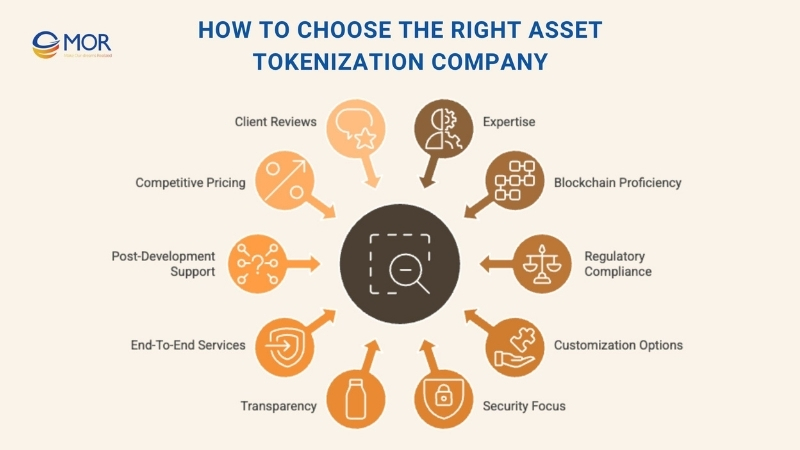
Assess Their Expertise
Start by examining the company’s background and portfolio. Look for proven experience in asset tokenization, smart contract development, and blockchain-based asset management. Reliable firms usually have a diverse project history across real estate, commodities, art, and intellectual property. This confirms their ability to tailor tokenization of assets for different business needs.
Evaluate Blockchain Proficiency
The best asset tokenization companies work with leading blockchain networks such as Ethereum, Polygon, Binance Smart Chain, and Solana. A team with multi-chain expertise can help you choose the right ecosystem for your project while ensuring security, scalability, and performance.
Prioritize Regulatory Compliance
Compliance is non-negotiable. Since tokenization often involves securities laws, make sure your chosen partner provides legally compliant solutions that meet local and international standards. A trustworthy firm will guide you through KYC, AML, and data privacy requirements to help you stay aligned with all regulatory frameworks.
Check for Customization Options
Every asset type has its own rules and complexities. The ideal company offers flexible, custom-built token models that match your operational structure. This includes support for fractional ownership, automated governance, and adaptable asset tokenization platforms for future updates.
Security Focus
Security remains a top concern in defi tokenization and digital trading. Choose a company that prioritizes encryption, multi-signature authentication, and cybersecurity audits. These measures protect your tokens from data breaches, fraud, and unauthorized access.
Transparency in Processes
The right asset tokenization company should maintain full transparency regarding its workflows, timelines, and costs. Clear communication and documentation help establish mutual trust and prevent misunderstandings throughout the development cycle.
Look for End-to-End Services
Select a company that provides complete asset tokenization companies to invest in level services, from token creation and blockchain integration to wallet management and post-launch maintenance. Working with one provider ensures consistency, reduces costs, and simplifies long-term scaling.
Post-Development Support
Blockchain systems continue to evolve. Make sure the company you choose offers ongoing updates, maintenance, and technical support. Reliable post-launch service is key to keeping your tokenized assets secure and adaptable to future changes.
Competitive Pricing
While cost matters, the cheapest option isn’t always the best. Compare pricing models among asset tokenization companies and choose one that balances affordability with quality. Value, reliability, and long-term support should outweigh short-term savings.
Client Reviews and Testimonials
Before making a decision, review client feedback and testimonials. Positive reviews and repeat clients are strong indicators of professionalism, reliability, and project success.
When approached strategically, these steps will help you select a trusted partner capable of delivering scalable, compliant, and secure asset tokenization solutions that align with your goals.
Partner With MOR Software For Asset Tokenization Projects
Building a tokenized asset ecosystem takes more than technical skill. It requires a reliable software partner who understands blockchain architecture, compliance, and real-world business needs. MOR Software brings all three together through practical experience and proven results.
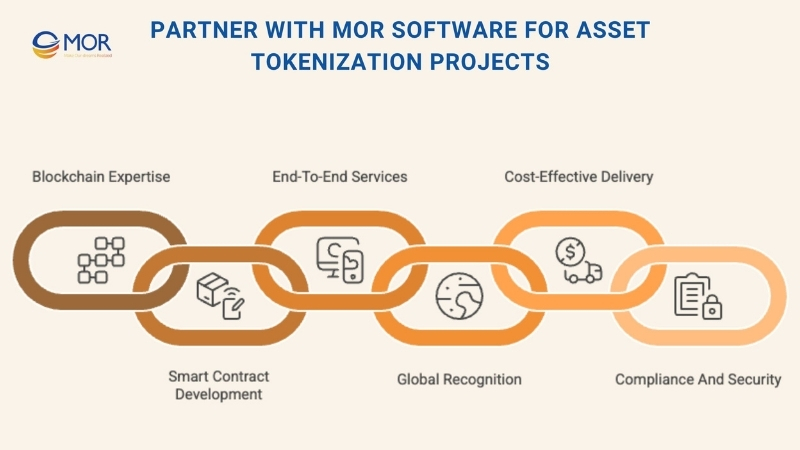
- Blockchain Expertise: Our team develops secure and transparent blockchain systems that power tokenized assets across industries like real estate, finance, and healthcare.
- Smart Contract Development: We build and audit smart contracts that govern transactions and ownership with precision, ensuring compliance and security.
- End-to-End Services: From consulting and design to deployment and maintenance, we handle the full development cycle to keep projects efficient and cohesive.
- Global Recognition: MOR Software has completed 850+ projects for clients across Asia, Europe, and North America, earning trust through consistent quality and measurable outcomes.
- Cost-Effective Global Delivery: Our teams in Vietnam and Japan combine world-class engineering with competitive pricing, delivering reliable solutions without cutting corners.
- Compliance and Security Focus: Every project aligns with KYC, AML, and international regulations to safeguard data and meet investor trust standards.
Partnering with MOR Software means gaining a long-term ally that blends technology expertise with business vision. We turn complex blockchain ideas into scalable, secure, and compliant platforms that move your business forward. Contact MOR Software to begin your asset tokenization journey today.
Conclusion
Asset tokenization is redefining how businesses manage and trade real-world assets. Choosing the right asset tokenization companies can unlock new liquidity, transparency, and investment potential. With deep blockchain expertise and proven delivery, MOR Software helps organizations build secure, scalable tokenization platforms that meet global standards. Ready to turn your assets into digital opportunities? Contact MOR Software today to start your tokenization project with a trusted technology partner.
MOR SOFTWARE
Frequently Asked Questions (FAQs)
What does an asset tokenization company do?
An asset tokenization company helps businesses convert physical or intangible assets, like real estate, commodities, or intellectual property, into digital tokens on a blockchain. These tokens represent ownership, enabling secure trading, transparency, and fractional investment.
Why should businesses consider asset tokenization?
Tokenization increases liquidity for traditionally illiquid assets, reduces transaction costs, and allows global investors to access markets that were once restricted. It also provides a transparent record of ownership through blockchain technology.
What types of assets can be tokenized?
Almost any asset with verifiable ownership can be tokenized. Common examples include real estate, artwork, company equity, gold, oil, bonds, patents, and even in-game items or collectibles.
How do asset tokenization companies ensure compliance?
They design systems that meet KYC (Know Your Customer), AML (Anti-Money Laundering), and securities regulations in relevant jurisdictions. Many companies integrate automated compliance checks and legal frameworks into smart contracts.
How long does it take to develop a tokenized asset platform?
Timelines vary depending on project complexity and regulatory scope. A standard tokenization platform usually takes 4–8 months, covering consultation, development, auditing, and deployment.
What technologies are used in asset tokenization?
Most companies build on blockchains like Ethereum, Polygon, Binance Smart Chain, or Hyperledger. Development often involves Solidity for smart contracts, cloud hosting, and API integrations for trading and compliance features.
How does asset tokenization improve liquidity?
By dividing assets into digital tokens, owners can sell smaller portions to multiple investors. This fractional model opens new liquidity channels and shortens settlement times through blockchain transactions.
Are tokenized assets secure?
Yes. Tokenized assets are protected through blockchain’s cryptographic infrastructure, smart contract auditing, and secure digital wallets. Top firms also use data encryption and multi-factor authentication to prevent unauthorized access.
What should businesses look for when choosing an asset tokenization company?
Key factors include technical expertise in blockchain, experience with similar projects, regulatory knowledge, scalability options, and transparent communication throughout the project lifecycle.
Rate this article
0
over 5.0 based on 0 reviews
Your rating on this news:
Name
*Email
*Write your comment
*Send your comment
1